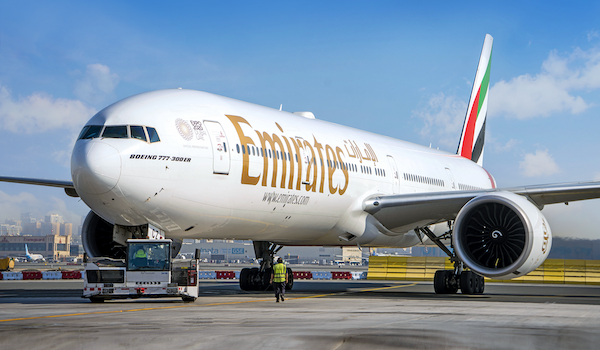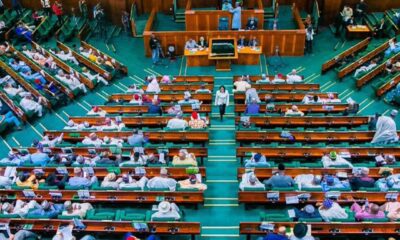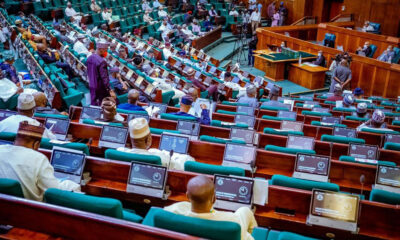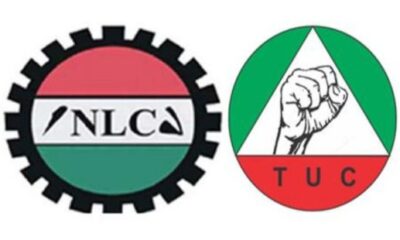Top Story
Oct 3 strike action: Pressure mounts as NEC, Reps, others beg Labour to shelve plans
…Nigeria cannot withstand another mass action — Reps
Pressure may be mounting on the organised labour as both governmental and political bodies seeking to talk out the major unions, the Nigeria Labour Congress (NLC) and Trade Union Congress (TUC), from plans to embark on an indefinite strike set for Tuesday, October 03, 2023, have heightened efforts with various approaches.
The organised labour was on Thursday overwhelmed with pleas from political and government bodies at the instance to convince the unions from embarking on a nationwide industrial action, which they argued would not benefit the Country.
The National Economic Council (NEC) on Thursday urged the organised labour to reconsider its decision to embark on the planned nationwide strike set for next week Tuesday, October 3, 2023.
Addressing State House Correspondents after its 136th meeting, Plateau State Governor, Caleb Muftwang said, “Council looked at the implications of the strike for the economy and the nation and thus urge members to continue to engage with the leadership of their respective states and to appeal to them to shelve the action and continue on the path of dialogue with the Federal Government.”
…Reps beg organised labour, appeal for dialogue
Meanwhile, the House of Representatives has on its appeal to the organised labour, implored leadership of the unions to consider dialogue in a bid to address the matters of dispute, against embarking on the indefinite strike.
The Deputy Spokesman of the House of Representatives, Philip Agbese, appealing to the NLC and TUC leaders in a statement he signed on Thursday, said the Country’s economy cannot withstand the intending mass action of organised labour.
Calling on the union leaders to dialogue with the Federal Government, he said, “Let me also use this opportunity to appeal to the Organised Labour not to succumb to agents of destabilisation who want to pull us back. The issue of palliatives and better welfare for all citizens is paramount before the Asiwaju government.
“Our nation can not withstand another mass action. We are trying to build not destroy. The Labour should, therefore, give dialogue a chance and at least be patient with this administration. It is still early days.”
The lawmaker, who said the removal of fuel subsidy by the President was in the best interest of the country, noted that fuel subsidy had been a part of the nation since the 1970s, and had made a few richer.
He said that available figures showed that the Buhari administration paid a subsidy of over N11.4trillion, more than what the government spent on education, health, and infrastructure during the period under review.
He acknowledged that President Tinubu’s decision to end the regime has come with hardship, but said Nigerians will celebrate in the long run.
According to him, fuel subsidy constitutes 50 percent of the nation’s problem and its termination will usher the country to her glorious era in history.
“President Tinubu must be commended for taking the bold step to save the future of our nation. Fuel subsidy was no longer attainable.
“It is on record that about N40.1billion is spent daily to subsidize every liter of petrol consumed in Nigeria by at least N600. It means the government spends about N1.24 trillion on fuel subsidies monthly.
“The country is in massive debt and would need more money to subsidize fuel. According to the World Bank, the government is projected to achieve fiscal savings of approximately two trillion naira ($2.6 billion) in 2023, equivalent to 0.9% of GDP. These savings are expected to reach over 11 trillion naira ($14.3billion) by the end of 2025.
“This will be invested in healthcare, education, and infrastructure. Indeed, the advantages of the removal of subsidy would not just come up immediately. It is not possible because the economy is not strong. We don’t have money to start implementing measures that will ameliorate the removal of the subsidy.
“However, we must look beyond the present. The future of our great nation is at stake. I want to commend President Tinubu for this brave decision. In a matter of time, Nigerians will smile,” he said.
…APC group begs Labour
Among the stream of appeals, a support group of the ruling All Progressives Congress (APC) on Thursday appealed to the leadership of the organised labour to reconsider their resolve on the planned nationwide strike in the interest of the Country.
In a statement issued in Abuja on Thursday, National Coordinator of the National Progressive Hub, Bukie Okangbe, pleaded with the union leaders to give the Federal Government the benefit of doubt in restructuring the economic framework of the country.
“As a support group of the APC, we are pleading with our labour leaders to reconsider their stand on the planned indefinite strike so as to continue their engagement with the government. It has been proven overtime that instead of positive results, strike action in Nigeria has always yielded negative impacts on not only the economy but also on the welfare of the citizens. We must consider the possible negative effects of the strike on sensitive sectors like health, security, education among others.
“We understand the labour leaders have already threatened to go on a nationwide indefinite strike over the fuel subsidy removal starting from the 3rd of October, 2023. We believe that they can shelve this planned strike action and allow for a continued engagement with the federal government on the issue. The National Progressive Hub is confident that President Bola Ahmed Tinubu is highly committed to addressing the issues and concerns raised by labour leaders regarding the fuel subsidy removal. As a progressive and listening leader, he has already approved the sum of N5bn to each state as palliative to ease the burden of the subsidy removal.
“The President, upon removal of the fuel subsidy, immediately constituted a committee on the upward review of the minimum wage. It is expected that a new minimum wage would be announced soon by the federal government. Tinubu has also been engaging with international community’s at every opportunity to making sure that they increase their foreign investment in Nigeria as a country with high economic prospect.
“Of course, some of these international engagements have started yielding results as some foreign investors have already indicated interest to invest billions of dollars in Nigeria’s economy in different,” the group said.
Recall the NLC and TUC had jointly on Tuesday, September 26, declared the resolve to begin an indefinite strike on Tuesday, October 3, in protest against what has been described as anti-people policies by the new President Bola Tinubu led Federal Government, particularly over the hardship that has trailed the removal of subsidy payment on premium motor spirit (PMS), popularly called petrol.
Suspense further built up over the planned action as the leadership of the Labour Party (LP) on Wednesday threw its weight of support behind the planned industrial action of the unions, saying the presidency has been insensitive to the plight of Nigerian workers.
The organised Labour has threatened to ground activities nationwide from October 3 following the failure of the government to successfully implement policies to alleviate the sufferings of the masses after the removal of fuel subsidy.
“It’s going to be a total shutdown, until the government meets the demand of Nigerian workers, and in fact Nigerian masses,” the union leaders affirmed in a joint statement.
They said, “The Federal Government has refused to meaningfully engage and reach agreements with organised labour on critical issues of the consequences of the unfortunate hike in the price of petrol which has unleashed massive suffering on Nigeria workers and masses.”
After the 21-day ultimatum given by the NLC lapsed last week, the NLC National President, Joe Ajaero, had lamented that none of the demands put before the Federal Government was addressed.
Among other things, the NLC and the TUC are asking for wage awards, implementation of palliatives, tax exemptions and allowances to public sector workers and a review of the minimum wage.
In a statement on Wednesday, by its National Publicity Secretary, Obiora Ifoh titled ‘Workers strike: Labour Party identifies with Nigerian workers’ the Labour Party bemoaned that Nigerian workers have shown enough patience and understanding.
While charging supporters of the party to stock up on food, the party warned that the leadership of LP will support any legitimate means to demand better welfare for Nigerian workers.
Recall NewsDirect had reported how that the meeting held, barely two weeks, between the Federal Government and the NLC ended in deadlock without clear direction on cancellation of the strike.
The declaration of the indefinite strike by NLC is trailing a warning strike which held two days across the nation, on Tuesday, September 05 and Wednesday, September 06.
Barely a week after leading the two-day nationwide warning strike, the NLC again threatened to embark on an indefinite strike should the Federal Government fail to meet its demands at the end of a 21-day ultimatum which expired last week.
According to the NLC, the proposed strike was necessary following the failure of the Federal Government to provide palliatives to assuage the hardship of Nigerians as a result of the fuel subsidy removal.
The NLC which had on September 01, 2023 handed down a 21-day ultimatum to the Federal Government over the delay in sharing of palliatives, had said it might be compelled to embark on an indefinite labour action if appropriate responses from the government were not taken.
Top Story
Account enrollment: Court validates CBN’s regulation, permits collection of customers’ social media handles


…Dismisses concerns, says social media handles not protected by privacy rights
…Financial institutions cleared to collect social media handles for KYC
By Sodiq Adelakun
The Federal High Court in Lagos has ruled in favour of the Central Bank of Nigeria (CBN) in a case challenging the regulation that requires financial institutions to collect their customers’ social media handles as part of the Know-Your-Customer (KYC) procedure.
Recall that the Socio-Economic Rights and Accountability Project (SERAP) had urged the court to compel CBN to withdraw its directive to banks and other financial institutions.
However, in the ruling, Justice Nnamdi Dimgba struck out the suit filed by Lagos-based lawyer, Chris Eke, who argued that the regulation violates the right to privacy of bank customers.
Eke had sought a declaration that the regulation contained in Section 6(a) (iv) of the Central Bank of Nigeria (Customer Due Diligence) Regulations, 2023, is undemocratic, unconstitutional, null, and void, as it contradicts Section 37 of the 1999 Constitution of the Federal Republic of Nigeria (as amended). However, Justice Dimgba ruled that the regulation does not breach the right to privacy of bank customers.
The CBN regulation is targeted to enhance customer due diligence and anti-money laundering measures, and requires banks to collect social media handles, among other personal information, from their customers.
The applicant had asked the court to grant an order of perpetual injunction, restraining CB from enforcing the regulation which requires financial institutions to request customers’ social media handles as part of normal bank customer due diligence requirements.
The CBN in its response to the suit, filed a notice of preliminary objection, challenging the competence of the suit. The apex bank also disagreed that the said regulation constitutes any interference with the private life of the applicant, as claimed.
The judgment came as Justice Dimgba dismissed a suit, stating that the notice of preliminary objection held merit and consequently struck out the case.
During the proceedings, Justice Dimgba emphasised that providing a social media handle is akin to furnishing email addresses, phone numbers, and other contact details for banking purposes.
He argued that such information aids in conducting due diligence to ascertain if an individual is suitable for conducting business with a bank.
Justice Dimgba further explained that the essence of having a social media account implies a willingness to engage in public communication, thus rendering privacy concerns unfounded.
According to him, “First, the Applicant claims that the requirements on the CBN Regulations for financial institutions to request and collect the social media handle of its customers as part of KYC infringes on his right to privacy.”
“This claim is very ambitious and amounts to a very far throw. The said Regulations are directed to and apply to financial institutions. It does not apply to private individuals such as the Applicant.
“Even if, as appears to be argued, that the Regulations itself would inevitably affect the Applicant, this claim is speculative for the simple reason that in nowhere in the affidavit in support was it stated that the Applicant operates an account with a financial institution and that the said institution had demanded his social media handle. So the suggestion that he would be affected by this Regulation, albeit negatively, is very speculative and at large.
“Secondly, there is also no deposition to the effect that any financial institution had begun to implement this Regulation and that its implementation had begun to create disruptions and inconvenience against the general population, in which case one could infer that the suit should be legitimated as a public interest litigation.
“Thirdly, assuming even that the banks had begun to implement these regulations, the applicant assuming he maintained any bank accounts or sought to open one, but is being hindered or irritated by the requirement of the Regulation to avail his social media handle as part of KYC, the Applicant still had a choice, which is to refuse to do business with any bank insisting on the information as part of its social media handle, but to seek other alternatives.
“Fourthly, and for all it is worth, I do not see how asking a banking or potential banking customer to provide his social media handle can ever amount to a breach of privacy.
“Granted that Section 37 of the Constitution of the Federal Republic of Nigeria 1999 (as amended) provides inter alia: The privacy of citizens, their homes, correspondence, telephone conversations and telegraphic communications is hereby guaranteed and protected.
“My view is that the provision of a social media handle is of the same genre as the provision of email address, phone numbers and other means by which a potential customer of a bank can be contacted.
“Thus, it is clear from the face of the Regulations as set out above that email addresses, phone numbers and social media handles are all provided for under clause 6iv just to show that the aim was not to pry on anyone but rather to provide alternative ways by which a customer of the bank can be contacted, and or due diligence conducted on the person to determine if the person is a fit and proper person to extend banking services to.
“I do not see how this infringes on the right to privacy. I should even say that the essence of having a social media account was for one to be publicly visible communication-wise. It, therefore, appears quite ironic, though wryly, that one can suggest that asking for information about a social media handle with which the individual exposes and immerses himself or herself in the public, can amount to a violation of privacy rights, which rights itself is all about isolation of one from public glare.
“It is also to my knowledge that even in filling some business applications, personal information of this sort, is sometimes requested, and parties generally oblige. If it does not constitute a breach of privacy, why should it now?
“A social media handle is left at large for the world to see, being in the public space, everyone enjoys the liberty to have access to it whether or not consent was obtained. It would be highly unreasonable to hold the Respondent in breach of privacy for what other persons have access to.
“The apprehension of the Applicant of his social interactions being monitored is manifestly speculative in itself and rather incredulous to believe that the financial institutions have the luxury of time to concern itself with such frivolities.
“On the whole, if I did not sustain the NPO, I would have dismissed the suit for the reasons stated. But the NPO having been sustained, the suit is therefore hereby struck out.”
Top Story
N1.3trn power debt: Tinubu approves payment, unveils plan to liquidate gas debts


President Bola Ahmed Tinubu has given approval for the payment of N1.3trn legacy debts owed power generation companies.
Minister of Power, Chief Adebayo Adelabu speaking at the 8th Africa Energy Market Place 2024 in Abuja said that President Bola Tinubu has approved a plan to liquidate the debts.
According to him, “Mr. President has approved the submission made by the Minister of State Petroleum (Gas) to defray the outstanding debts owed to the gas supply companies to power generation companies. The payments are in two parts, the legacy debts and the current debts. For the current debt, approval has been given to pay about N130 billion from the gas stabilisation fund which the Federal Ministry of Finance will pay.”
“The payment of the legacy debt will be made from future royalties in exchange for incomes in the gas subsector which is quite satisfactory to the gas suppliers. This will allow the companies to enter into firm contracts with power generation companies.
“For the power generation companies, the debt is about N1.3 trillion and I can also tell you that we have the consent of the President to pay, on the condition that the actual figures are reconciled between the government and the companies. This we have successfully done and it is being signed off by both parties now. Majority has signed off and we are engaging to ensure that we have 100 percent sign off.
“The debt will be paid in two ways, immediate cash injection and through a guaranteed debt instrument, preferably a promissory note. This assures the companies that in the next three to five years, the government is ready to defray these debts.”
The Minister further stated that the government was working to get the distribution companies solvent and effective by unbundling their operations along state boundaries.
He insisted that the areas covered by the current DisCos were too large for them to deliver effective services to consumers.
In the same vein, the Chairman of the Nigerian Electricity Regulatory Commission (NERC), Engr. Sanusi Garba lamented the poor financial state of the DisCos, noting that it is difficult for them to raise the needed capital to invest.
Engr. Garba pointed out that the challenges facing the sector were a culmination of all past inactions and missteps by those saddled with the responsibilities of managing the sector both at policy and operational levels.
According to him, “Today when you look at distribution companies they are clearly and technically insolvent, and you also want them to raise capital in terms of debt or equity. It’s a Herculean task. I also want to mention that implementing the power sector reform requires very strong political will to implement decisions that impact on the wider public.”
However, the African Development Bank (AfDB) disclosed that it has so far spent over $450 million to support various power sector projects and programmes with another $1 billion planned to support the power sector reform effort by the government.
Top Story
Emirates Airline to resume Lagos-Dubai flights October 1


Emirates Airline has disclosed that it will resume services to Nigeria from October 1, 2024, operating a daily service between Lagos and Dubai.
This development was announced in a statement on Thursday by the airline, which has its hub in the United Arab Emirates (UAE).
The airline disclosed that flight services will be operated using a Boeing 777-300ER.
“We are excited to resume our services to Nigeria. The Lagos-Dubai service has traditionally been popular with customers in Nigeria and we hope to reconnect leisure and business travellers to Dubai and onwards to our network of over 140 destinations.
“We thank the Nigerian government for their partnership and support in re-establishing this route and we look forward to welcoming passengers back onboard,” Emirates’ Deputy President and Chief Commercial Officer, Adnan Kazim, said.
Recall that Emirates Airlines had suspended its Dubai-Lagos flights in 2022 over its inability to repatriate trapped funds in Nigeria in the heat of the diplomatic row between the two countries.
This comes after Festus Keyamo, Minister Of Aviation And Aerospace Development in a post on his X (formerly Twitter) page had disclosed that he got correspondence from Emirates Airline when he visited Salem Saeed Al-Shamsi, ambassador of the United Arab Emirates (UAE) in Abuja.
”Yesterday, I paid a working visit to the Ambassador of the UAE to Nigeria, His Excellency, Salem Saeed Al-Shamsi at the UAE Embassy in Abuja. He handed me a correspondence from the Emirates Airline indicating a definite date for their resumption of flights to Nigeria,” Keyamo said.
-
Finance4 months ago
Court orders Sen. Victor Umeh to repay N136m bank debt to AMCON
-



 Abuja Update3 months ago
Abuja Update3 months agoUNDP, FG partnership needed to achieve inclusion, equity- Minister
-
Abuja Update2 months ago
Banks drive stock market performance with N147bn gain
-
capital market2 years ago
Rt.briscoe, FBNH, Others halts negative performance of stock market
-
Submission Guidelines4 months ago
CALL FOR SUBMISSIONS: POETRY COLUMN-NND
-



 Health1 month ago
Health1 month agoCapacity training will reduce migration of health workers- NPHCDA
-



 Business4 weeks ago
Business4 weeks agoTingo Group unveils Tingo Electric, Tingo Cola drink at Lagos launch
-
News5 months ago
Oil thieves sponsoring malicious media campaign against Navy – Spokesman












